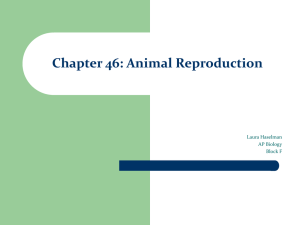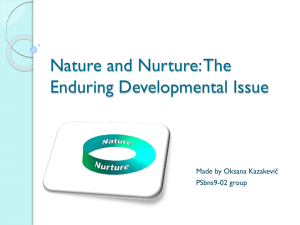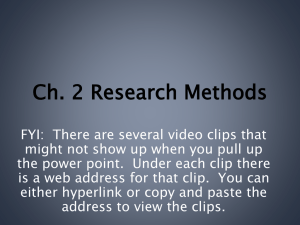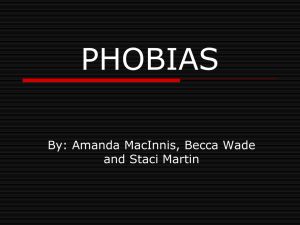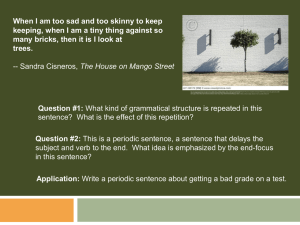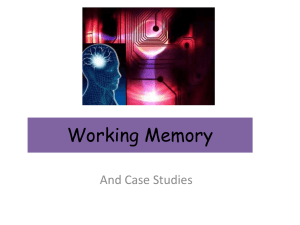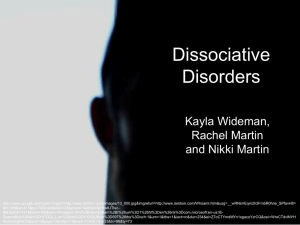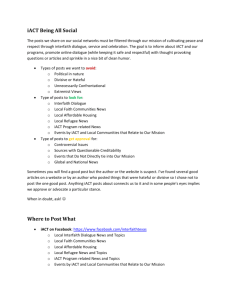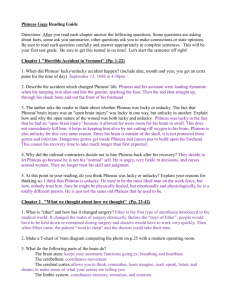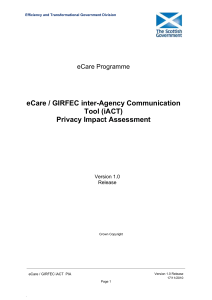TOK phineas gage lindsey emilie
advertisement
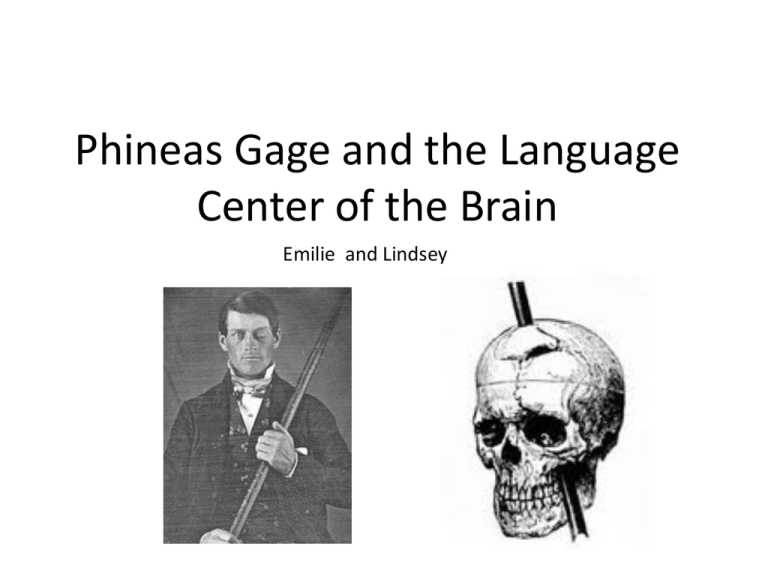
Phineas Gage and the Language Center of the Brain Emilie and Lindsey Background • Born in 1823 • Foreman of a railroad construction company near Cavendish Vermont • Most capable, efficient, well-balanced mind, shrewd, smart businessman • Known for survival of serious brain damage http://www.deakin.edu.au/hmnbs/psychology/gagepage/Pgstory.php The Accident • September 13, 1848 • Accidental explosion of a charge he had set • Blew tamping iron through his head -Under left cheek bone and out through top of head -Landed 25-30 yards behind him -Spoke within minutes -Walked with little assistance Recuperation • • • • Long and difficult Pressure on brain left him semi-comatose Seldom spoke (only mono syllables) Died 12 years after accident (May 23, 1860) after suffering from epileptic seizures Brain Damage • Left frontal lobe completely destroyed • Personality changes: impatient, obstinate, profane, unable to settle on plans devised for future, fitful Functions of Frontal Lobe • Contains most of the dopamine sensitive neurons in the cerebral cortex • Associated with reward, attention, long term memory, planning, drive, impulse control, social behavior • Ability to recognize future consequences resulting from current actions; choice between good and bad • Involved with higher mental functions http://en.wikipedia.org/wiki/Frontal_lobe Language Center of Brain • Broca’s Area and Wernicke’s Area • Linked to speech production and language comprehension • Spoken words sent to Wernicke Area where structure of signal is compared with memory of the word to understand meaning Language as a Way of Knowing • Whole section of the brain devoted to language and the brain is where we understand knowledge • Similar to Saussure Views: • Signifier doesn’t mean anything by itself so the brain automatically associates it with its meaning • Saussare “All signs arbitrary, and all signs have only arbitrarily ascribed or assigned meanings. Each society, through its language, gives meaning to its signs through combining sound-images (signifiers) with concepts (what is signified).” Bibliography http://en.wikipedia.org/wiki/Frontal_lobe http://en.wikipedia.org/wiki/Phineas_Gage http://www.deakin.edu.au/hmnbs/psychology/gagepage/Pgstory.php http://www.google.com/imgres?imgurl=http://neatorama.cachefly.net/images/2010-03/phineas-gageskull.jpg&imgrefurl=http://reexamineall.wordpress.com/2010/03/26/the-strange-tale-of-phineas-gage/&usg=__6HJo7s2qosQfOuICeJ56FaFW5s=&h=207&w=150&sz=9&hl=en&start=14&zoom=1&tbnid=0_FMd9n9K3RsDM:&tbnh=109&tbnw=79 &ei=3QqeTf_SD8e_tgedpb3mBA&prev=/search%3Fq%3Dphineas%2Bgage%26hl%3Den%26safe%3Dactive%26biw%3D1003% 26bih%3D399%26gbv%3D2%26tbm%3Disch0%2C266&itbs=1&iact=hc&vpx=458&vpy=102&dur=750&hovh=165&hovw=120& tx=115&ty=98&oei=OQqeTdKYEsi3tgfJqpjgBA&page=2&ndsp=14&ved=1t:429,r:10,s:14&biw=1003&bih=399 http://www.google.com/imgres?imgurl=http://www.macalester.edu/psychology/whathap/diaries/diariess04/matt/languageb rain.gif&imgrefurl=http://www.macalester.edu/psychology/whathap/diaries/diariess04/matt/week11.html&usg=__4YDmRhl0 w7Ueia2agWr_tpAhqg8=&h=324&w=501&sz=22&hl=en&start=0&zoom=1&tbnid=_Ej3RxUFwLDfuM:&tbnh=103&tbnw=159& ei=qRCeTdfeJcXXgQfCvYDcDw&prev=/images%3Fq%3Dbroca%2527s%2Barea%26um%3D1%26hl%3Den%26safe%3Dactive%2 6biw%3D1003%26bih%3D399%26gbv%3D2%26tbm%3Disch&um=1&itbs=1&iact=hc&vpx=268&vpy=90&dur=3141&hovh=18 0&hovw=279&tx=186&ty=109&oei=qRCeTdfeJcXXgQfCvYDcDw&page=1&ndsp=10&ved=1t:429,r:1,s:0 • http://www.google.com/imgres?imgurl=http://1.bp.blogspot.com/_MHFHb7j_0l8/Sl58MbbOlI/AAAAAAAAB1s/uHWzQQ3_Il8/s320/Phineas%2BGage.jpg&imgrefurl=http://carlosvarelapsychology.blogspot.com/&usg=__IXsuLQigsGazNvQcCHo9eSEi09Y=&h=320&w=235&sz=16&hl=en&start=42&zoom=1&tbnid=JIOIIJfUsD WKQM:&tbnh=104&tbnw=75&ei=TwqeTfrhDo-tge3lPnABA&prev=/search%3Fq%3Dphineas%2Bgage%26hl%3Den%26safe%3Dactive%26biw%3D1003%26bih%3D399%26gbv%3D2%26tb m%3Disch&itbs=1&iact=rc&dur=250&oei=OQqeTdKYEsi3tgfJqpjgBA&page=4&ndsp=14&ved=1t:429,r:7,s:42&tx=48&ty=58
